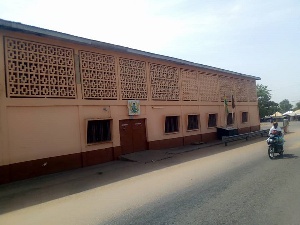- Home - News
- TWI News | TV
- Polls
- Year In Review
- News Archive
- Crime & Punishment
- Politics
- Regional
- Editorial
- Health
- Ghanaians Abroad
- Tabloid
- Africa
- Religion
- Election 2020
- Coronavirus
- News Videos | TV
- Photo Archives
- News Headlines
- Press Release
General News of Thursday, 22 November 2018
Source: starrfmonline.com
Inmates at Navrongo Prisons in dire need of drugs, mattresses
The most populous correctional facility in the Upper East region— the Navrongo Central Prisons— needs more drugs, blankets and mattresses for the 261 inmates being held there, the Ghana Prisons Service (GPS) has told Starr News.
It is a desperate need at the roadside jailhouse as the freezing harmattan winds begin to herald the Christmas season and the New Year.
“The government is sincerely doing its best but it cannot do it alone. Kindhearted individuals, faith-based organisations, the NGOs and benevolent agencies, we are appealing, should also come to the aid of the inmates with medications, blankets and mattresses.
“Our infirmary is the first port of call when they are sick but we lack basic drugs there. It is when it’s beyond the infirmary that they refer them (the inmates) to the hospital. This is the season malaria outbreak is too high for us. Most of the mattresses they are using are worn out. They are in pieces. Currently, we don’t have enough blankets for them,” said the Upper Regional Public Relations Officer of Prisons, ASP Alhassan Nyankpani.
Inmates learn to make their own Soap
A five-day workshop, aimed at imparting soap-making skills to the inmates, is underway at the house of correction.
The training, initiated by the Upper East Regional Commander of Prisons, DDP Henry A. Dasser, began Monday and is scheduled to end Friday.
“The Prisons, as you know, has a mandate to keep inmates in safe custody, to reform them and to rehabilitate them. The Upper East Regional Commander of Prisons went for support from a resource person who agreed to take them (the inmates) through the process.
“When they finally know how to make this soap, it would reduce the burden on the public purse because the government is supposed to supply them soap every month. If, by the help of the Regional Commander, they are able to make soap, I think in future they would not be buying soap again. Whilst in prison custody, they would do it themselves to help and when they are discharged, that is what would help them not to reoffend,” ASP Nyankpani explained.
He added: “The temptation of reoffending is very high when, after discharge, you don’t have any skills. That is why the Regional Commander arranged for the workshop.”
Public Entreated to Support Inmates’ Rehabilitation
Fifty of the inmates at the detention centre, according to ASP Nyankpani, are being trained this week and they will, in turn, train the others.
One question— as to how the inmates would get the tools and the raw materials to produce the soap whilst in custody— came up as the Public Relations Officer spoke about the ongoing training programme at the prisons.
In reply, he said: “Instead of government removing money from the public purse to cater for them in terms of soap, if we can get support from the public, they can easily do it here and it would help them to be on their own. The public can support them with tools so that after their discharge they can work with those tools.”
The inmates have also been taught how to weave smocks. Samples of the smocks put on display this week by the prisons authorities looked so well made stunned observers could not but hail the prisons authorities for living up to their mandate and the inmates for appreciating the value being added to their lives.
“We do smocks. But because of lack of funds, we cannot do it in larger quantities. We are appealing to the public on this one, too, or even individuals who think they can support by investing in it. When he (the individual investor) brings the money, they (the inmates) can do it in larger quantities for him and he would go and sell,” said ASP Nyankpani.
When asked where the proceeds would go after selling the smocks, he said: “The inmates would get a share of the proceeds but it would be put aside so that when they are discharged they can use the money as capital to start up their own businesses. The public can kindly support the inmates in that regard to augment the support government is giving to the inmates and the Ghana Prisons Service.”











